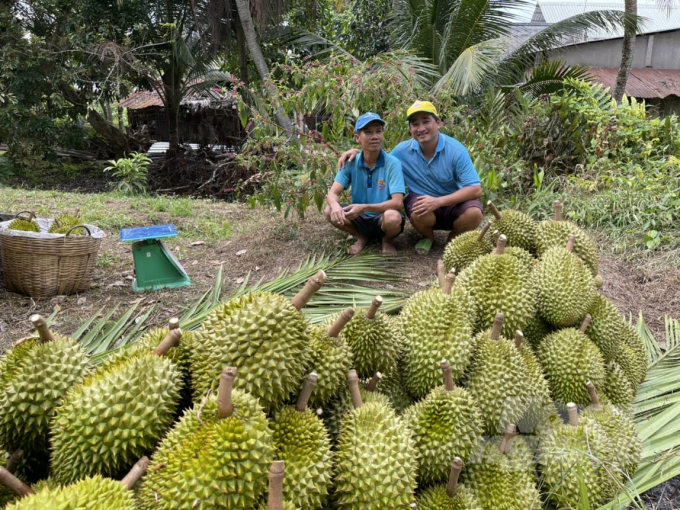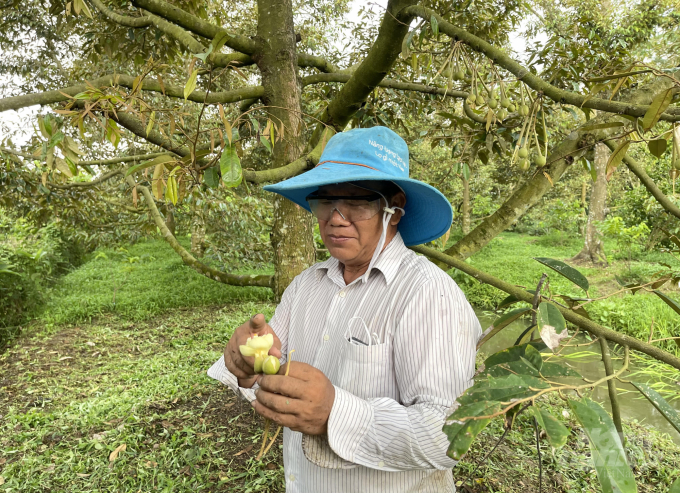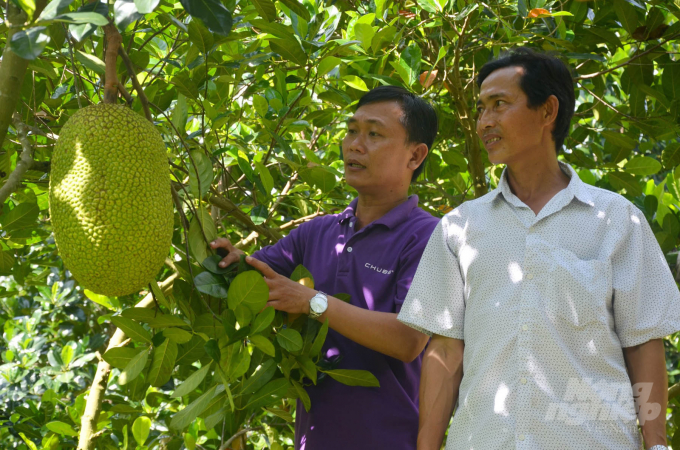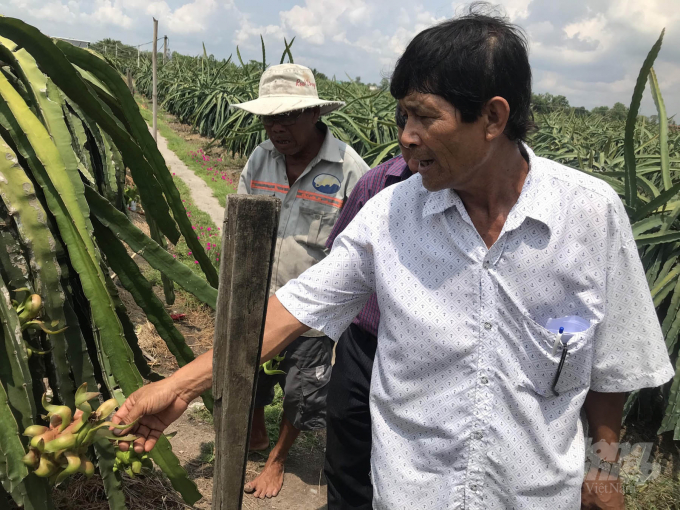May 21, 2025 | 07:15 GMT +7
May 21, 2025 | 07:15 GMT +7
Hotline: 0913.378.918
May 21, 2025 | 07:15 GMT +7
Hotline: 0913.378.918

Durian Ri6 grown in Phong Dien District, Can Tho City. Photo: HD.
Farmers in the Mekong Delta provinces changed time and crops for cultivation to adapt to the negative impacts of climate changes.
Some moved farms back into hinterlands to easily take fresh water from upstreams. Others shifted to grow fruits that generate higher economic efficiency.
With freshwater available around the year, relatively completed system of irrigation and transportation, Can Tho identified advantages for developing orchards.
Local authorities have had solutions for a sustainable agricultural economy to adapt to climate change, implementing the Government’s Resolution 120/NQ-CP on sustainable development of the Mekong Delta Region.
Phong Dien District - one of four suburban districts in the city – has favourable conditions to accelerate the transformation process and promote the economic efficiency of orchards.
Thanks to its natural geographical advantages and a dense network of canals, the district was planned to become an ecological urban area.
Farming and tourism would be developed together professionally and effectively.
Phan Thanh Trung, head of the district’s Agriculture Promotion Centre said that the district now only had about 1,000 ha of rice while farmers changed crops and concentrated on some key crops.

Farmer Bay Vinh in Tan Thoi Commune, Phong Dien District, Can Tho City applies VietGAP in his durian farm. Photo: HD.
The district now had more than 8,500 ha of fruits including over 1,800 ha is for Ri6 durian.
Local farmers are also growing popular fruits like jack fruit, seedless lemon, longan and strawberry.
Local authorities helped farmers and co-operatives to further connect markets. Until now, the district has 18 co-operatives.
Tan Thoi durian growing co-operative group in Truong Dong B Hamlet, Tan Thoi Commune was established in 2017 with nine members and 13 ha.
Until 2020, the group had 20 members and its total orchard area reached nearly 20 ha. The members share farming techniques and offer loans to each other.
In August 2019, the durian growing co-operative group was certified to apply VietGAP, ensuring food safety, origin traceability and protecting farmers’ health and environment. The applications of advanced technologies helped reduce costs thanks to a reduced amount of fertiliser, pesticide while the durian could be sold at high prices.
Bay Vinh, a farmer in Tan Thoi Commune said that instead of growing many crops and fruits, four years ago, he started specialising in durian.
He said that once applying proper farming techniques, he could harvest 2 tonnes of durian per công (equally 0.1 ha) and sell a kilo of durian for over VND 45,000.
Meanwhile, as following VietGAP standards, he spent only VND 25 for his four công, he said, adding that the farming was good for the environment.
Other durian farmers in Phong Dien District confidently said that they could earn more than VND 1 billion per hectare if they worked hard and applied proper farming techniques.
In Tien Giang Province, more rice land has been used for growing fruits.
In 2017, about 2,700 ha of rice was turned into orchards. In 2019, more than 4,200 ha was shifted. Nearly 13,000 ha of rice have been shifted to orchards since 2017.

Jackfruit is grown in My Loi A Commune, Cai Be District in Tien Giang Province. Photo: MD.
According to the province’s Department of Agriculture and Rural Development, rice farming usually generates about VND 41-43 million per ha per year while jackfruit could bring VND 300-600 million per ha, red-flesh dragon fruit VND 800-850 million per ha, while-flesh dragon fruit VND 200-300 million per ha, grapefruit VND 400-700 million per ha.
Many durian farms in the province reportedly get from VNĐ 500 million to VND 1 billion per hectare per year.
Mai Hoang Em, an agriculture officer in My Loi A Commune, Cai Be District said that local farmers had shifted from rice with fruits like orange, durian and jackfruit since 2010 as seeing high economic benefits of the fruits.
For example, jackfruit could bring farmers VND 400-500 million per ha on average.
Farmer Vo Van Tien said that he grew 1.5 ha of Thailand jackfruit since 2013 and earned bout VND 500-700 million per year.

Farmers grown dragon fruit in Binh Phu Commune, Go Cong Tay District in Tien Giang Province. Photo: MD.
In Binh Phu Commune, Go Cong Tay District, farmers used to get unstable incomes as rice farming was negatively affected by droughts and saline intrusion.
For the last few years, some farmers started growing dragon fruit instead.
Farmer Bui Van Ruong of Binh Ninh Hamlet said that income from growing white flesh dragon fruit was 7-8 times higher than income from rice farming.
He started growing dragon fruit in 2014, expanded the farming area from 3 công to 7 công, he said, adding that he earned VND 200-300 million from the dragon fruit.
Huynh Van Quang, chairman of Binh Phu Commune Farmers’ Association said that before 2016, farmers in the commune grew only rice.
Since farmers saw the effectiveness of dragon fruit farming, they shifted to grow the fruit, Quang said, adding that now, there was more than 100 ha of dragon fruit in the commune.
With high drought tolerance, the dragon fruit could grow well in Binh Phu Commune - an area that usually faces a shortage of fresh water.

(VAN) Khanh Hoa is investing over 545 billion VND to develop 240 hectares of high-tech marine aquaculture in order to guarantee a consistent supply of seafood exports and achieve the USD 1 billion target.

(VAN) Minister of Agriculture and Environment Do Duc Duy held a meeting with Soopakij Chearavanont, Chairman of C.P. Group, on May 15.
/2025/05/16/3800-0-nongnghiep-143756.jpg)
(VAN) Suntory PepsiCo Vietnam coordinated with the Ministry of Education and Training to implement an education program on water conservation, reaching nearly 1 million primary school students nationwide.

(VAN) Vietnam’s TH Group officially put its high-tech fresh milk processing plant into operation in the Russian Federation, marking a historic moment as the first TH true MILK cartons were produced in Russia.

(VAN) Use of high-quality broodstock and biotechnology is regarded as the most effective approach to ensuring sustainable and economically viable shrimp aquaculture ahead of climate change and the emergence of increasingly intricate disease patterns.

(VAN) Carbon farming is a form of agricultural practices that helps absorb more greenhouse gases than it emits, through smart management of soil, crops, and livestock.

(VAN) This is a key content of the Memorandum of Understanding recently signed between the Vietnam Fisheries Society and Kunihiro Inc of Japan.